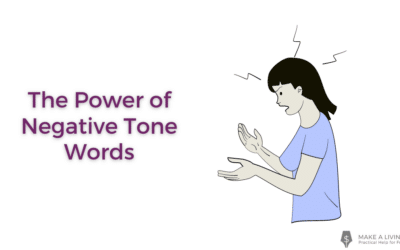Feeling stuck? There’s a lot of advice out there about freelance writing.
Sure, some of it’s good.
But some ideas you might have about freelance writing can leave you feeling like you’re standing in cement or slowly suffocating in the grip of a python.
- Have some limiting beliefs about what you need to know, do, or feel to get the ball rolling in your freelance writing biz?
- Stuck on a certain step that you can’t get past to move forward or get better clients who pay you quality rates?
Every writer has their hang-ups. Maybe you think you need a bigger network. Or maybe you’re convinced you need to take all the courses before starting. Maybe you think you need to know everything other writers are doing, so you don’t make any mistakes.
Here’s the thing…It doesn’t matter if you’ve made $5 or $50,000 from freelance writing.
Every writer struggles with certain freelance writing myths that can hold you back. And it doesn’t have to be that way.
In this post, we’re busting 12 common freelance-writing myths so you can stop hole-ing up behind false walls, break through barriers, and create the freelance writing career you want.
1. I need to know which niches make money
This is one of the most common questions we get in the Freelance Writers Den, because writers think that if they just pick the right niche, they’re set.
Myth: You think you need to know and research all the top money-making niches before you start.
Here’s the thing…No matter how much money a niche might make one freelancer, it doesn’t guarantee you’ll make the same. They might have specialized knowledge, years of experience, or get super excited about topics that sound to you like watching paint dry.
Solution: Look for niches that combine your experience and knowledge with demand and good rates.
- Where can your past job experience work to your advantage?
- What types of clients are in that niche with enough revenue to pay freelancers good rates?
It matters more that you can continue writing about a topic and building your knowledge base, which then brings money, than trying to pinpoint niches that may not work out for you. Profitable AND fun always wins.
2. I need to know every type of writing out there
Don’t know how to write a white paper or case study? Not sure what content strategy means? You may not know now, but I’m sure you could figure it out.
Myth: You think spending significant hours researching all the types of writing you could do will help narrow down the types of writing you like or want to do.
FYI. It won’t. You’re not actually writing and getting paid if you’re spending all your time researching what you could be doing.
Solution: Scratch the surface of info about a type of writing to see if it may be a fit for you and your ideal clients. Then start marketing to see if any of your prospects have that content project in the works.
I can’t tell you how many hours I’ve wasted in my seven years of freelancing learning about writing projects I’ve never done, so don’t fall into the same trap.
3. I need to know everything about running a freelance business
Myth: You think you need to know everything about running a freelance writing business before getting started. Ahem…it’s kind of impossible to know everything, and it’s why a lot of freelancers never get started.
FYI…I’ve been writing for over a decade, freelancing almost as long, and I still don’t know everything about running a freelance writing business. That should help any newbies breathe a sigh of relief that running a business is a constant learning process.
Solution: Just start. You’ll make mistakes. Probably wish you did a project differently. You may cringe at that holiday email you sent to clients with a really embarrassing typo (which I did). But not knowing 100 percent how to do everything shouldn’t stop you from growing a great business. Get out there and start learning by taking on some entry-level writing jobs.
Use what you’ve got, in the situation you’re in, and take the steps to do better every day.
4. I need to know how long it takes to…
Myth: You think there’s a universal amount of time it takes to complete a project. And until you find out what it is, you’re not going to move an inch.
This is like asking someone: “How long does it take you to clean your house?”
- You live in a tiny, one-bedroom, one-bathroom apartment in the city with a dog that sheds a lot.
- They live in a sprawling 5,000-square-foot house with four bedrooms, three bathrooms, a playroom, a finished basement, and a couple of kids.
There’s no way to even begin comparing, let alone how that would help you figure out how long it would take you to do it.
I totally understand when we’re crowdsourcing to get an idea for time management. But oftentimes, I’ve found that my estimate compared to others is way off. That other freelance writer might:
- Be a quicker researcher
- Be a slower/faster writer
- Have more experience as a freelancer or journalist
- Use a VA to help them out
- Have a different schedule
It’s not easy to translate their writing and marketing skills to your. Plus, you might steer yourself away from a fantastic project because someone said it took them two weeks to complete, when it would have taken you four days.
Solution: Instead, track yourself with a time tracker. Then create averages in a spreadsheet, so you have an idea to measure for your project timelines. It’s not about how much time it takes someone else to write. It’s about your own average time to complete a project.
5. I need to take a ton of online courses
Hi. I’m Mandy Ellis, and I love online courses.
There, I said it. I’m a learning junkie. But I don’t let my love of learning hold me back from taking necessary forward steps in my business. I’ve taken dozens (probably even hundreds) of online classes, and they provide excellent foundations.
Myth. You think you need to take online courses to build a successful freelance writing business. But you keep taking courses, without taking action. And you frequently lose focus on the purpose of taking a course, creating a roadblock of analysis paralysis.
Solution: The truth is, it’s up to you to implement what you’ve learned through action combined with trial and error. Dive into courses, but don’t get stuck in the learn-and-churn mindset that prevents you from applying knowledge to grow your business.
6. I need to work for free or dirt cheap for a while
I may not have ever worked for free, but I certainly worked for dirt cheap for way, way too long…like years.
Myth: When you’re starting out, you think you have to take low-paying work like $25 for a well-researched article with expert interviews that’s 1,500 words. Maybe you think you even need to work for free.
Remember those writers who started at $1/word at the newsstand mags? That was a dream I thought was years away. But that’s only because I started writing for such low rates.
Solution: Just like you don’t need hundreds of clips with all types of writing examples to get clients, you don’t need to work for free or for peanuts just to get clips.
- Charge what you’re worth.
- Find the large pool of great clients who pay well for valuable content.
- Spend time marketing to those prospects rather than churning out 100 articles per month at a content mill.
7. I need to feel ready
This is still one of my biggest struggles so I’ll give you the inside scoop.
Myth: You think everything has to be perfect before you can start. You put off pitching or even accepting work, because you’re not ready.
FYI…Every time I felt I wasn’t ready and took the step anyways, it worked out better than I hoped. You can’t prepare for a step you’ve never taken. And anything that pushes you to be a better writer and business owner is going to make you feel un-ready.
Solution: Sometimes, it’s about jumping and learning how to fly on the way down, as cliché as it sounds. But it makes you grow much faster than hoping and wondering when you’ll feel ready to start or grow a freelance biz. Nothing will ever be perfect, especially if you don’t start, try and fail, learn from your mistakes, and keep going.
8. I need all the right tools
From SEO keyword research to interview recording to freelancer invoicing, I’ve seen all kinds of questions about every random tool in the Freelance Writers Den.
Myth: You think you need a long list of tools (that usually cost money you don’t have), and make excuses about getting started until you do.
Fact: I’m a big nerd when it comes to finding the perfect product, but finding the right tool doesn’t pause my business.
Solution: Start your freelance writing business lean with free tools. Only add a new tool to your business if it solves a problem or saves time.
- DO NOT spend hours looking for the best invoice template or grammar checker
- DO Spending hours hitting your deadlines and looking for quality clients
- When the need arises, go ahead and search for a good-enough tool to get rid of annoying issues, like a calendar app that helps schedule interviews or client calls.
9. I need connections
Over the years, I’ve known writers who began freelancing with thousands of LinkedIn connections. But me, I had zero connections and no network to speak of and still built a business I love.
Myth: You think you need a huge network of contacts in your niche. You get overwhelmed thinking about growing your network. So you either do nothing, or spend too much time networking. And not enough time pitching, working, and getting paid to write.
Solution: Although it’s a nice perk to start freelancing with a huge network, you don’t need one to start your writing career. You can simply:
- Reach out by email or LinkedIn with a quick letter of introduction
- Attend a virtual or local in-person networking event
Both are effective ways to build your business while building your network.
Bonus: You may realize it’s a bonus to build your LinkedIn network after you’ve started freelancing. Why? You start making connections with the premise that you’re a freelance writer in certain niches.
10. I need a writer website
Myth: You think you need a writer website before you can start marketing to find clients and get paid to write. And since you’re not a web designer, you put it off for days, weeks, months or years. Your website doesn’t get built, and you don’t get any clients. Sound familiar?
Truth: You don’t need a writer website to get started or find your first client.
Websites are an ever-evolving beast that you tweak as you grow and add clips, testimonials, and photos. I’ve had hundreds of site templates and designs myself.
But there’s no reason that spending time on pretty themes, adding the “right” clips, or getting everything in place should stop you from reaching out to prospective clients right now.
Solution: Build your website alongside your business and you’ll see growth in both. Or just use your LinkedIn profile as your calling card to get your first clients, then invest in building your writer website.
11. I need a massive portfolio
Myth: You think you need a massive portfolio of freelance writing samples for prospects to take you seriously. So you talk yourself out of marketing, or work for crappy clients that don’t help build your portfolio.
Ever heard stories of freelance writers whose first clips came from the New York Times or Wall Street Journal?
- These writers had zero clips and landed some of the most coveted bylines.
- They didn’t flash a giant portfolio.
- They wrote an amazing, unique pitch that was timely and caught the editor’s eye.
- It was about the writing chops they showed in their audition (AKA their pitch) that got them the spot. And so can you.
Solution: Think big, and start pitching. Everyone starts with zero clips. It’s the writers who keep marketing, honing their writing skills, and taking action who end up with giant, shiny portfolios.
12. I can’t get freelance work if I live in a small town
Myth: You think living in a small town without many large employers and too far away from a metropolitan hub limits your ability to land top freelance writing clients.
Let me change your mind about this…
Several graduates of the Freelance Writers Den 2X coaching program are thriving and live in small towns. Why? They’re looking for national opportunities in states where their niches are booming. Sometimes the best clients live in a different time zone.
Solution: Seek out where the big fish live to get the clients, work, and pay you want. Don’t be afraid to go big and reach out to companies in Silicon Valley, New York City, Seattle, or Austin where many niches are not only succeeding, but growing rapidly.
You can build a successful freelance writing business
Which freelance writing myths do you struggle with most? We play plenty of head games with ourselves as writers. The ideas that hold us back from the clients, life, and income we want can be the most insidious. How can you break through these myths to start, move up, earn more, and make a living writing. Follow Carol’s advice: “Be a writer, not a waiter.”
What freelance writing myths are holding you back? Let’s discuss in the comments.
Mandy Ellis is an Austin-based freelance writer and content marketing strategist. She’s also a freelance writing coach, and co-host of the Bootcamp: Get Your First Freelance Writing Jobs with Carol Tice.












